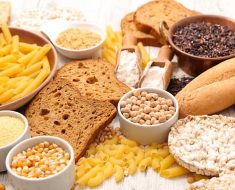We’re quick to blame gluten for gut issues, but could these covert parties be the real causes of your grief?
If you’ve ever had that gurgle followed by a ‘get me to the bathroom … now’ situation at dinner, we feel you. But, pointing your finger at the bread basket may be doing the white stuff a disservice. While gluten has become the poster child for digestive issues, wheat allergies and coeliac disease only affect one to two per cent of the Aussie population. What’s far more common? Food sensitivities.
“This is when an individual is only able to tolerate a small amount of a certain food or compound within the food,” says Chloe McLeod, accredited practising dietitian and co-founder of elite nutrition hub Health & Performance Collective. Such sensitivities are thought to affect more than 20 per cent of the global population and can be caused by a variety of foods – including a few that you likely don’t suspect. Like these guys…
THE SUSPECT: Lectin
YOU’LL FIND IT IN: Veggies, animal and dairy products and legumes
You’d be hard-pressed to track down a food that doesn’t contain lectin. The carb binding protein is found in most animal and plant-based products. In high amounts, lectin can be toxic to humans but, in food prods, it’s prepped in a way that’s safe to eat. That said, it can still cause gut strife for some people.
YOUR MOVE: Lectin is found in the highest concentration in legumes (especially uncooked kidney beans), whole grains and nightshade veg (aka members of the plant family Solanaceae, which include eggplant). So, if you suspect you’re sensitive, McLeod suggests soaking and cooking legumes and grains before eating them. This washes away most of the lectin and makes the foods easier to digest.

THE SUSPECT: Xylitol
YOU’LL FIND IT IN: Anything sugar-free – chewing gums, mints, dental products, lollies and ice-creams.
Yep, the yum stuff. Xylitol, a type of sugar alcohol extracted from the birch tree, has a similar sweetness to sugar but 40 per cent fewer kilojoules, making it a popular artificial sweetener. But, things aren’t all sweet with sugar alcohols like this (others include ‘sorbitol’ and ‘mannitol’), which hang out in the FODMAP camp (see ‘Garlic’ below for more on that). “Sugar alcohols ferment in the large intestine and can draw water to the bowels,” explains accredited practising dietitian and nutritionist Marika Day. “This can lead to gas, bloating and even diarrhoea.” Not-so yum.
YOUR MOVE: Check ingredients labels for lurking sugar alcohols, especially in products labelled ‘sugar-free’.
THE SUSPECT: Garlic
YOU’LL FIND IT IN: Everything, including sauces and marinades. Chances are it’s a staple smell in your kitchen.
The base ingredient of pretty much every recipe on earth is part of the Allium family, with siblings including onion, eschalot and leek. Garlic is rich in something called fructan – a FODMAP. As most of you already know, FODMAP stands for Fermentable Oligosaccharides, Disaccharides, Monosaccharides and Polyols – a fancy name for a group of long-chain carbohydrates that ferment in the large intestine. “This is actually an incredibly beneficial process, as it fuels and feeds gut bacteria,” says Day.
“However, in some people with a hypersensitive gut, it can cause excessive gas production, wind, cramping and diarrhoea.” Fructan is one of the most common FODMAPs and – get ready for an aha moment – found in some foods that also contain gluten, such as wheat, rye and barley. A study in the journal Gastroenterology revealed that, in a group of people who thought they were gluten sensitive, it was actually fructan that was causing more of their digestive troubles.
YOUR MOVE: Worried about FODMAPs? Many nutrition experts agree that the most effective diagnosis tool is a FODMAP-food elimination diet under specialist guidance. Once your trigger is identified, then the rest of the foods can be reintroduced.

THE SUSPECT: Corn
YOU’LL FIND IT IN: Oh, just about any barbecue or cheeky Mexican feast.
Food newsflash: those pesky sugar alcohols aren’t just hiding in processed foods. “Corn contains a polyol called sorbitol, a type of sugar alcohol found in fruits, vegetables and sweeteners,” says practising nutritionist Amy Savage. “Polyols attract water into the bowel and if you suffer from IBS or other gut sensitivities, it may induce a laxative effect with loose stools and diarrhoea, as well as abdominal discomfort and flatulence.” As for foods made from field corn – think popcorn and corn chips – and those sweetened with high-fructose corn syrup, they pack old-mate fructan.
YOUR MOVE: It may sound corny (#sorrynotsorry), but savour food. Wolfing down corn may cause it to pass through your system undigested, leading to gas and abdo pain. So, chew as much as possible.
Source: Read Full Article





